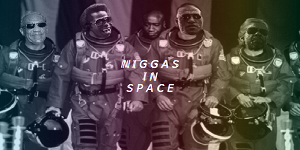

User Controls
Do circles objectively exist?
-
2021-11-01 at 11:49 AM UTC
Originally posted by troon Whenever I visualize your circle in discrete space, I always see quantization happening between points on the circumference. I can visualize a very good approximation of a circle, but no better. Which of us is retarded?
Outside sense of smoothness isn't a condition of a circle. In an ultimately discrete space, the only criteria you have to fulfill is that whatever the discrete units of space are, the perimeter is just equidistant from a fixed point.
Instead of imagining a grid with square "pixels" (essentially the proposition that there are 4 basic degrees of freedom from any given point if we are thinking about a 2D space), imagine instead the basic "pixel" is hexagonal (6 degrees of freedom in 2D).
Now imagine one hexagonal tile, that has another 6 hexagonal tiles surrounding it, one touching each edge. In that space, this would be considered a circle. -
2021-11-01 at 11:51 AM UTC
Originally posted by troon Interesting, but the phrases 'rapidly decays' and 'excepting quantum fluctuations' suggest that variations exist at a small enough scale.
The event horizon is completely featureless, hawking radiation is more complicated. It's a loss of energy by gravitational means but it manifests as photons near the horizon. Nothing ever touches or escapes or disturbs the horizon. It just recedes from us. -
2021-11-02 at 2:30 AM UTCDo any nonphysical things really exist objectively?
-
2021-11-02 at 8:56 AM UTCACKSHUALLY gravitational waves are constantly warping spacetime by a minute amount so all measurements are completely meaningless since the amount of space between any two points is never fixed and therefore all measurements are subjective and nothing in reality objectively exists haha i am very smart
-
2021-11-02 at 8:58 AM UTCbut actually ACKSHUALLY the interdimensional vibrations caused by god stroking his cosmic stiffy are merely causing the illusion of those gravitational waves, and spacetime is a jedi myth perpetuated by a cousinfucking lunatic who was too mentally deranged to comb his hair
-
2021-11-03 at 3:56 AM UTC
-
2021-11-03 at 4:01 AM UTC
-
2021-11-03 at 12:33 PM UTCHe's just stating some important facts. It's true that a hula hoop is, indeed, physical. Perhaps we should keep this fact in mind as we proceed.
-
2021-11-03 at 12:33 PM UTC
Originally posted by Meikai ACKSHUALLY gravitational waves are constantly warping spacetime by a minute amount so all measurements are completely meaningless since the amount of space between any two points is never fixed and therefore all measurements are subjective and nothing in reality objectively exists haha i am very smart
They're measurements so they're objective in some sense. -
2021-11-03 at 2:17 PM UTC
Originally posted by mmG Now imagine one hexagonal tile, that has another 6 hexagonal tiles surrounding it, one touching each edge. In that space, this would be considered a circle.
That's an interesting example, but it only covers one circle of r=1 in a very specific discrete space. Even assuming your example represents our reality, the question asked if circles (plural) exist. What's the next radius in this discrete space that would be considered a circle? -
2021-11-03 at 2:23 PM UTC
-
2021-11-03 at 3:31 PM UTC
Originally posted by troon That's an interesting example, but it only covers one circle of r=1 in a very specific discrete space. Even assuming your example represents our reality, the question asked if circles (plural) exist.
I know, it's a special case to tell you that the discreteness of a space doesn't stop you from defining a circle with points in that space. That doesn't in any way change the point.
There's no reason to assume squares rather than hexagons as an example or even necessarily that a diagonal cell movement is necessarily a greater distance than moving to an edge cell (in a space where the discrete cell is a square, and a 9x9 box in such a space would count as a "circle").
There's no reason to assume anything. This is not a subject where human intuition is necessarily valid. My point has nothing to do with assuming my example is true of the real world. It just shows a discrete won't mean you can't define a circle in it.What's the next radius in this discrete space that would be considered a circle?
Any integer r. Just keep wrapping hexagons around the perimeter. For example where r=2 that means you can reach any cell on the perimeter in 2 moves. The following users say it would be alright if the author of this post didn't die in a fire!
The following users say it would be alright if the author of this post didn't die in a fire! -
2021-11-04 at 12:21 PM UTCAlso nice alt gadzooknigger
-
2021-11-04 at 3:34 PM UTC
-
2021-11-04 at 4:01 PM UTCion shell theory is fascinating
-
2021-11-04 at 9:17 PM UTCYou'll ever familiar with scall ion theory?
-
2021-11-05 at 2:41 AM UTC
-
2021-11-05 at 10:31 AM UTC
-
2021-11-09 at 7:57 AM UTC
-
2021-11-09 at 7:59 AM UTCHARD TARDEDThe following users say it would be alright if the author of this post didn't die in a fire!